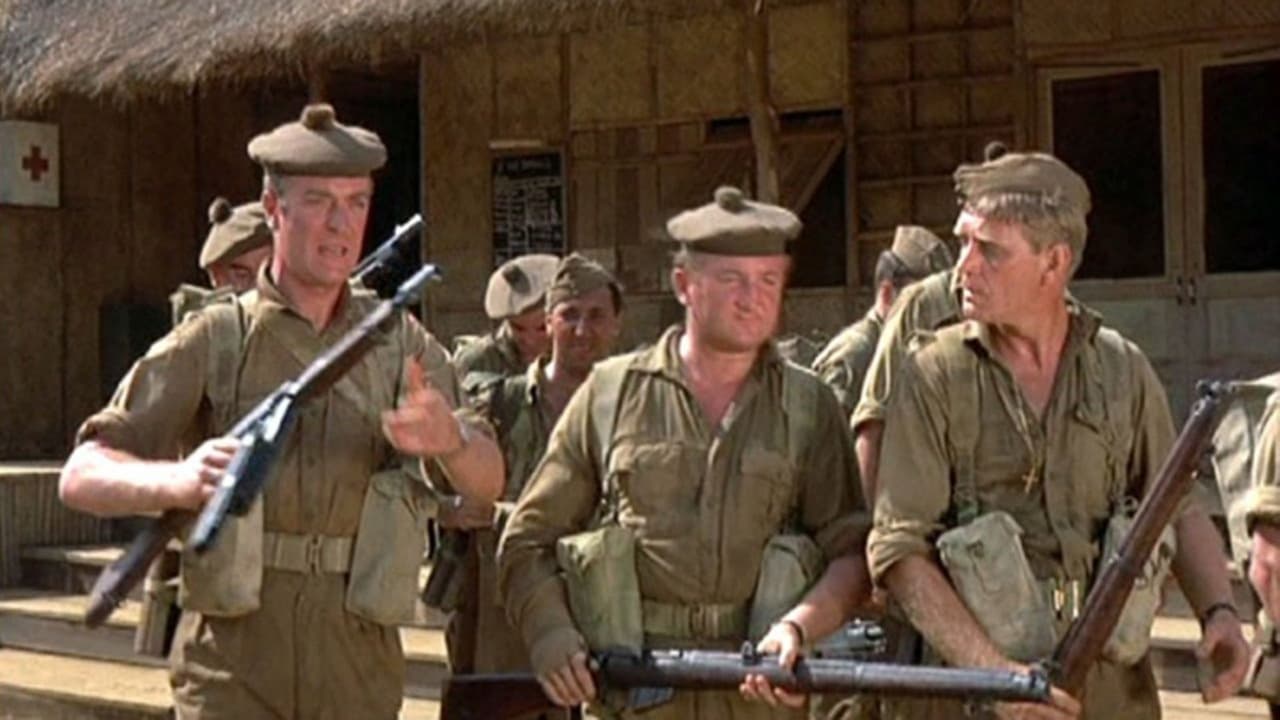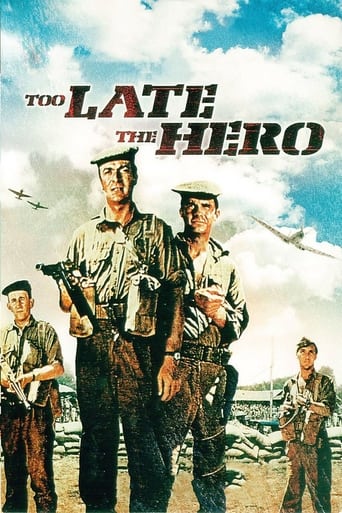

Dialogue supervisor: Robert Sherman. Producer: Robert Aldrich. Associate producer: Walter Blake. (Available on an excellent Fremantle DVD). An Associates and Aldrich/Palomar Production. U.S. release through Cinerama: July 1970. U.K. release through C.I.R.O.: 18 October 1970. Sydney opening at the Paris. 16,135 feet. 144 minutes. Cut by the distributor to 133 minutes in the U.S.A.SYNOPSIS: Mixing the time-honored clichés of the war film with a fashionable dash of cynicism, "Too Late the Hero" has Robert Aldrich stamped all over it. — Nigel Andrews in Monthly Film Bulletin.COMMENT: The main impediment to a favorable review of Robert Aldrich's film is its length. It could be trimmed by at least 30 minutes to advantage. I would start in on Ronald Foster's part, then I'd eliminate some of the close-ups and needlessly repeated reaction shots in individual scenes and trim the long sequence of the microphone pursuit which, despite Aldrich's commendable use of the sound track, goes on for far too long. Fortunately, the film comes to an exciting climax with its obstacle race across the plain, and some of the photography here is absolutely breathtaking. In fact, most of the film was obviously lensed on location. There is not even a single frame of stock footage - which is a pleasant and most agreeable surprise. But on the debit side, the story is uncomfortably akin to an earlier Aldrich war movie, "The Dirty Dozen", which has a more entertaining script and higher production values than this one. Also that film's cast was far more interesting. Despite his prominence in the credits, Henry Fonda makes only a fleeting appearance, and neither Cliff Robertson nor Michael Caine have a strong enough screen presence to overcome some of the weaknesses in their material — although they both make a game try. Admittedly, reliable old Harry Andrews is back as the British C.O., and the rest of the players are competent, but unfortunately lack the sort of sparkle the film needs.
... View MoreThis film is in many other ways a bit of a mess and didn't need to be. Not only is the film anachronistic, but it isn't very well thought out or logical as well. After all, an American (Cliff Robertson) is chosen to lead a secret mission of British soldiers because of his knowledge of the Japanese language (which makes sense) but through the course of the film, the soldiers sneaking into the Japanese sector of a contested island CONSTANTLY talk, yell and even sing!!! What part of SECRET is all this?! You would assume that with their lives at stake that they'd SHUT UP!! You'd also assume they wouldn't pick some of the worst soldiers in the history of films to be in this elite group...but one is practically a Japanese agent due to his CONSTANT disloyalty, bickering, stealing from the dead and MUCH worse. So you have an important mission and only send a few men and you make several of them totally evil and selfish. What sense does any of this make?!This film, like "Kelly's Heroes", is a revisionist picture. While the movie is supposedly set during WWII, it clearly is meant as a metaphor for the Vietnam war as well as shows the spirit of the 60s. Because of this, it's a lousy history lesson. Plus, combined with bad writing, it's really not a very good picture. And, at over two hours, it's a long ride.So if there anything I liked about the film? Well, I liked how they showed the Japanese soldiers and Michael Caine and Robertson weren't bad. They weren't exactly good, either. The ending was also pretty exciting. Other than that, it's a big-budgeted film that really isn't all that good.
... View MoreThe Cliff Robertson & Michael Caine World War II epic "Too Late the Hero" qualifies as another searing indictment of warfare. Producer & director Robert Aldrich recaptures some of the flavor of "The Dirty Dozen." Each film takes place against the backdrop of World War II. "The Dirty Dozen" occurred in Nazi-occupied France, while "Too Late the Hero" happens in the Japanese controlled South Pacific in spring 1942. Each group of warriors performs a special mission. The American military convicts in "The Dirty Dozen" received pardon offers to participate in combat. The British soldiers in "Too Late the Hero" aren't exactly convicts, but they aren't elite troops. Although it never coined the millions that "The Dirty Dozen" grossed at the box office, "Too Late the Hero" has ten times the depth and irony in its story-line than "The Dirty Dozen." Conversely, "The Dirty Dozen" is far more entertaining on a visceral level, while "Too Late the Hero" becomes terribly depressing until the final run across open ground with mortar teams lobbing shells and snipers blasting away nonstop as the brave Allied souls struggle to cross it. The ending is this movie's chief surprise. While "The Dirty Dozen" destroyed a château crowded with high-ranking German officers, the men in "Too Late the Hero" only blow up a radio transmitter. Nevertheless, the performances are flawless, and the characters are genuinely interesting. You'll recognize several familiar British faces, such as lantern-jawed Harry Andrews, Percy Herbert, Denholm Elliot, Ian Bannen, and Ronald Fraser, from other World War II movies.Oscar-winning actor Cliff Robertson of "Charly" plays U.S. Navy Lieutenant (J.G.) Sam Lawson who has an easy job eavesdropping on Japanese radio chatter and interpreting it. Lawson is nowhere near combat, until his Commanding Officer, Captain John G. Nolan (Henry Fonda), assigns him to a British commando team dispatched to blow up a radar station in the New Hebrides east of Australia. After an interesting opening sequence that features British, American, and Japanese flags disintegrating slowly as they flap in the breeze, the action shifts to a quiet U.S. Naval base in the South Pacific as the Shore Patrol searches for the elusive Lawson. They find him and escort him to Nolan. Lawson has been planning a four week leave and news that he is about to embark on a combat mission horrifies him. "This is something the British are organizing for us that involves a certain amount of physical hardship," Nolan brusquely informs him. Initially, Robertson believes that if he resigns his commission then he can get out of being sent on the mission because the British need an officer. Nolan is prepared to send him on the mission as an ordinary seaman if Lawson resigns. "I can't win, can I?" Lawson reluctantly accepts the mission. Clearly, "Too Late the Hero" couldn't have been made during World War II when war movies were hopelessly patriotic.The British plan cross the island to the north and destroy the Japanese radio so the enemy cannot wire a nearby island and request air support to bomb a U.S. Navy convoy which will pass near the radio camp on the coastline. Just before our heroes are to raid the Japanese camp and knock out the transmitter, the British soldier carrying their radio drops it by accident and permanently damages it so it no longer works. Predictably, Hornsby reacts with rage, but improvises another plan. They will overpower the Japanese radio operator and transmit their false message on the Japanese radio and then destroy it. Lawson refuses to follow Hornsby into the radio hut because he believes Hornsby is violating Colonel Thompson's specific orders. Earlier, Hornsby had exemplified the incompetent commander he was when he laid an ambush with his men on both sides of a column of advancing Japanese and five of his men died in the cross-fire from their own men. Once they reach the Japanese camp, he improvises rather well, but dies when Lawson refuses to participate in Hornsby's new scheme to relay the false message by the Japanese transmitter rather than their own transmitter. A battle breaks out and our heroes mow down their share of Japanese troops before they pull back. Accidentally, the next day, our heroes stumble onto a Japanese airfield that has been so well camouflaged that U.S. aerial reconnaissance hasn't spotted it. Our heroes flee but this time they are pursued by a Japanese officer who deploys speakers to try to lure them back to him so word will not reach enemy lines about the presence of their hidden airfield. Our heroes must now survive long enough to get back to base and inform Colonel Thompson about the enemy airfield.Producer & director Robert Aldrich co-wrote the story with Robert Sherman and the script with Lukas Heller. Although "Too Late the Hero" takes place in World War II, the film undoubtedly reflects the contemporary dislike for the Vietnam War. Ninety percent of the action occurs in the jungle and Aldrich gives the jungle a claustrophobic nature. Between the opening and ending no-man's land scenes, "Too Late the Hero" encloses the audience within high green walls. Once Lawson arrives at the British camp, he meets the camp commandant, Colonel Thompson (Harry Andrews of "633 Squadron"), and Captain Hornsby (Denholm Elliot), who will lead the mission, but none of Hornsby's men respect him. Hornsby is as worthless an officer as you can imagine, but he commands troops almost as worthless as he is. Indeed, Hornsby is taken aback by Lawson's negative attitude when he first meets him. "What an extraordinary fellow," Hornsby observes of Lawson. Colonel Thompson retorts, "Well, he's an American." Thompson then inquires about Hornsby's health and if he is up to commanding the mission. "It seems to me to be a marvelous opportunity to really hurt them," Hornsby replies to Thompson. Again, "Too Late the Hero" is as cynical a war movie as you will find.
... View MoreToo late the hero is one of the most boring movies that I've ever seen,well its not that bad,the action was good,the acting is decent and the battles are good.For a start,half way throughout the movie some things can just drive you insane and I'm not going to talk about that.It's about an American lieutenant who leads a platoon of British soldiers into a jungle somewhere in the Pacific to destroy a Japanese radio station.At that time a Japanese Major captured two men and are threatening the rest of the survivors to surrender or else he will kill them.As a lot of WWII movies are found interesting I found absolutely nothing interesting at all.The atmosphere for this movie is good and the effects are crap.This movie is nothing but sheer disappointment nd nothing can change that(yes,even a remake).The blood wounds are cheesy for a movie that was made in 1969.I don't know what the deal was on making this movie,it was probably seen as spectacular for its time.I was going to give it a 5 at the start but the boring parts made me give it a 4 instead.Mostly if you see a war movie you are expecting to see a lot of action but this is a war movie that should be avoided because there is barely any action in this movie.War movie fans will be disappointed with this heap of junk.
... View More